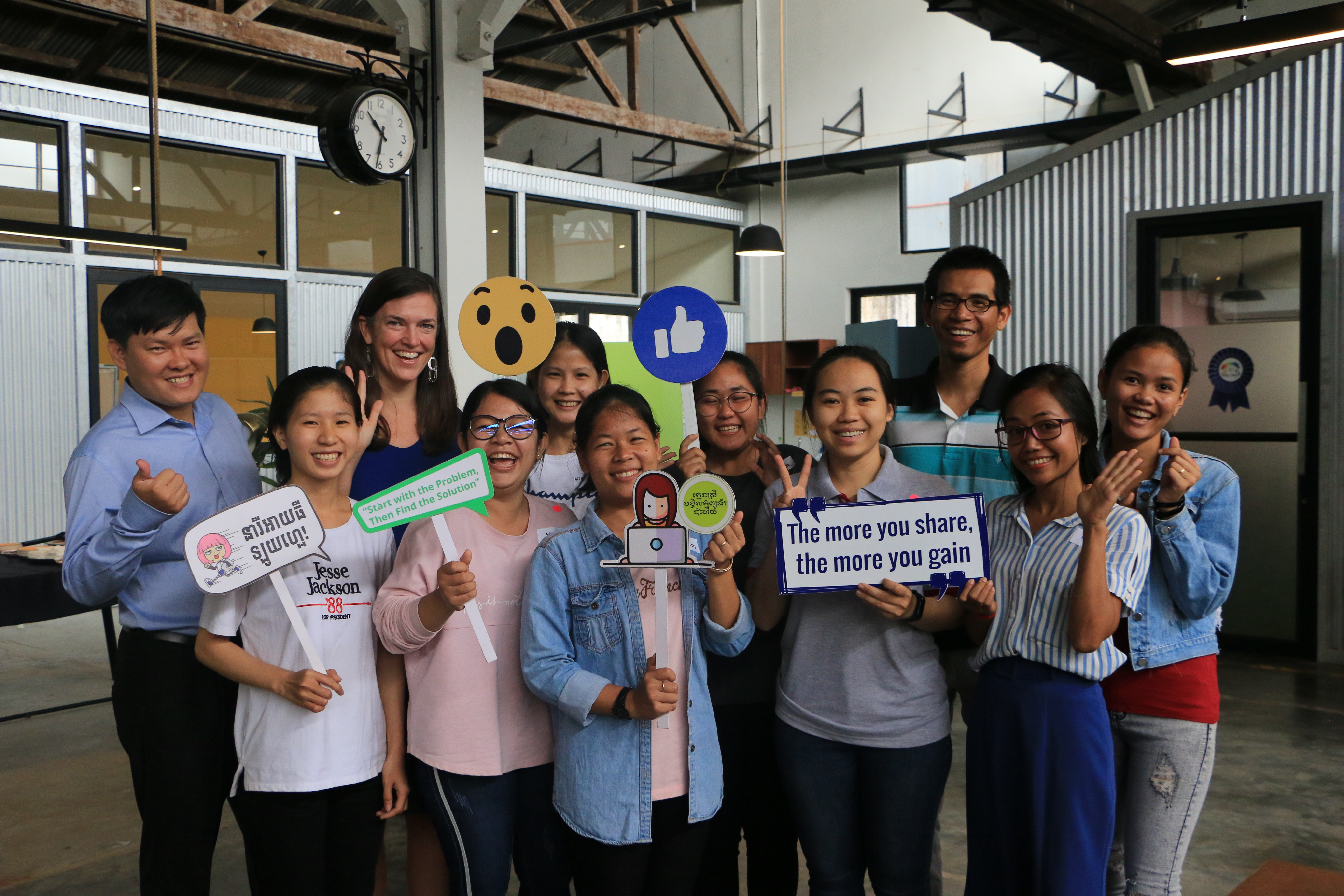
19 Nov Advancing Women in Tech Through Leadership Development and Mentoring in Cambodia
Women working in technology are still a minority worldwide. Wedu shares the insights of Wedu and USAID’s Development Innovation project “Mentoring and Leadership for Women in Tech in Cambodia”.
Like many other fields, women represent a minority in the tech field globally. The issue starts with the low number of girls pursuing STEM degrees at the university level as this is still seen as a male-dominated field. Only 20% of all jobs in technology are held by women worldwide (Source: Small Business Trends) and women earn just 18% of computer science bachelor’s degrees in the United States (Computer Sciences Organisation). The reality for Cambodia is similar. In 2019, Wedu, in partnership with USAID’s Development Innovations, launched the program to support 20 young women in the field and test a new mentorship model in Cambodia. Below, we share insights and lessons from our partnership.
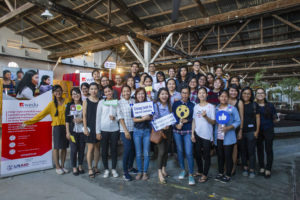 Wedu is a non-profit organisation and exists to nurture the leadership development of women around the world by supporting their unique, lifelong journeys with leadership development programmes, opportunities, and funding for education.
Wedu is a non-profit organisation and exists to nurture the leadership development of women around the world by supporting their unique, lifelong journeys with leadership development programmes, opportunities, and funding for education.
WHAT WOMEN IN TECH NEED
In 2018, USAID’s Development Innovations project conducted the design research study “Factors Affecting Women Engaging in Tech Careers in Cambodia,” reporting that “While the same barriers affect women in the tech industries across nations, additional pressures, institutional and cultural constraints prevent young women from pursuing career-advancing opportunities in the tech ecosystem in Cambodia”. The report states that only 8.5 per cent of female students in Cambodia were enrolled in Information Technology-related programs at university as of 2016, and contains several recommendations to increase the number of women in tech and to support those working in the field. One of the key recommendations was the need to provide “more support opportunities for meaningful mentorship, networking and leadership.” Following this recommendation, Wedu and Development Innovations designed a program that consisted of six months mentorship with a dedicated mentor to support the achievement of the 20 participant’s goals, that culminated in a three day training and networking event called the Wedu Women Leadership Academy. One program mentee working in the tech field said this program was valuable for her: “Mentorship has helped me find and follow new opportunities and allowed me to find my career aspirations. I came out knowing my strengths, and now I can start figuring out some of my weaknesses.”.
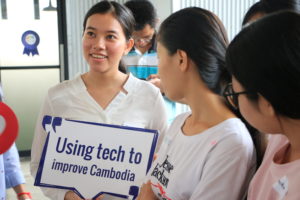 EXPOSURE TO FEMALE ROLE MODELS IN TECH FUELS INSPIRATION
EXPOSURE TO FEMALE ROLE MODELS IN TECH FUELS INSPIRATION
The worldwide scarcity of women leaders in tech contributes to the low number of women opting for tech education and career paths and a lack of representation for young women. Exposure to female role models is essential for inspiring and attracting young women into the field so they can develop their identities. Wedu made an effort to expose all 20 participants to female role models throughout the program — 80% of mentors were females. The Women’ Leadership Academy participants had the opportunity to meet and hear advice from influential female leaders in Cambodia like Ms Limsan Pong CEO & Founder of First Womentech Asia and Leakhena Long is a co-founder and COO of Joonaak Delivery which offers delivery services and complete eCommerce solutions for SMEs. During the event, participants explored questions and concerns that many women face (gender social expectations, family and work balance, thriving in a male-dominated field) and received advice from women leaders who have dealt with these barriers. One participant at the WLA shared: “I was very inspired by them (women in tech panel), they are such a great role model for me”
ADVANCING WOMEN IN TECH THROUGH LEADERSHIP DEVELOPMENT
If young women are to succeed in the tech field, they must be exposed to leadership development opportunities as early as possible. In our project, 50% of the participants reported an increase in their overall confidence at the end of the program. We asked participants in our needs assessment survey what skills they most require to enable their career success and what career path they are more interested in following. The top sought skills included Communication and Public Speaking, Entrepreneurial Skills, Finding Balance & Motivation, and Goal setting. Half of the participants (10 out of 20) plan to pursue the entrepreneurial path where they are able to bring technology solutions to everyday problems. After attending the Wedu Leadership Academy, 92% reported improvement in their Communication and Public Speaking skills and 85% saw improvements in Working Smart by Finding Balance and Motivation. One of the participants studying computer sciences shared what she learned through her experience: “During the program, I learnt a lot about business, tech entrepreneurs, and myself. I have improved my time management skills, as well as my confidence level, and public speaking skills.”
MENTORSHIP IS A POWERFUL DEVELOPMENT TOOL
In the application form, we asked: “What do you wish to learn from a mentor?” Most participants (78%) sought mentorship support on leadership, soft skills, and professional networking, while only 22% mentioned mentorship on technical skills. Each participant had a dedicated mentor according to their preference in the application stage. Mentorship is also key to support young women navigating important decisions. Those familiar with the concept of mentorship were able to fully engage with their mentors in a productive manner. One participant said her mentor helped her in unexpected ways: “My mentor is caring and encouraging but at the same time push me to my best as well. I have improved my critical thinking ability”.
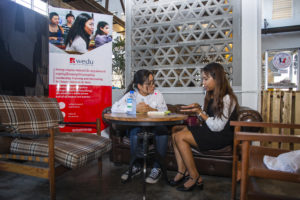 Mentorship was a key feature of the project and throughout the six month program participants engaged in different approaches of mentoring:
Mentorship was a key feature of the project and throughout the six month program participants engaged in different approaches of mentoring:
- One to one mentoring – each participant was paired with a dedicated mentor.
- Group Mentoring – A visit to the project learning sponsor SMART Axiata provided the opportunity to meet women leaders in tech working at the organisation who led group mentoring sessions in small groups.
- Speed Mentoring – During the Women Leadership Academy event , three key female influencers in the tech sector were invited to participate in speed mentoring where participants rotate every 20 minutes and listen to the guest mentors.
CHALLENGES AND LESSONS
Important to manage expectations from the start
- Mentorship as a concept is still new for most Cambodians.
- More support is needed to ensure all participants grasp the full value of mentorship and exposing them to success cases of mentorship by Cambodians.
Participants struggled to manage multiple priorities
- Engagement was one of the key challenges with 20% drop out in mentorship and 40% no-show at the final training session.
- Multiple priorities such as university and work generated stress and lack of focus on the mentorship program.
- In the future, Wedu programs may start with Women Leadership Academy (training) before matching the participants with their mentors. This is expected to increase the overall engagement.
In person support highly valued compared to online resources
- In person time spent with mentors was highly valued and appreciated. Most mentees were able to build a relationship with their respective mentors and some have continued beyond the project conclusion.
- USAID Development Innovations supported Wedu to fund the development and testing of a the Wedu Online Leadership Development Platform. Although most participants appreciated the platform and it uses, the daily access to the platform was lower than expected and more time was invested with communicating with mentors.
- The platform allows each participant to login into their account, manage mentorship sessions, set goals, access Wedu’s database of learning opportunities, register their achievements and enroll in training sessions.
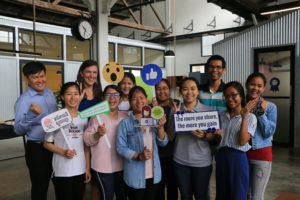
WHAT’S NEXT FOR WEDU IN CAMBODIA
Building on the success and lessons captured in both our recent projects with USAID’s Development Innovations (women in tech) and the British Embassy (women in STEM), we will continue to seek strategic opportunities and partnerships to support women in these fields in Cambodia. In addition, our ongoing Rising Star program is available in Cambodia for all women across fields who are committed to investing in their leadership development and offers opportunities for funding for education, training and mentorship.
We are strongly committed to our expansion in and have celebrated in June 2019 a partnership with the Ministry of Women Affairs (MoWA) to reach over 5000 women in the next six years in alignment with Cambodia’s National Strategy for Gender Equality and Women’s Empowerment. The aspiration is to enable women to realize their leadership potential and to become leaders of their own development; participating in decision-making on all levels of the public and private sectors in Cambodia.


Sorry, the comment form is closed at this time.